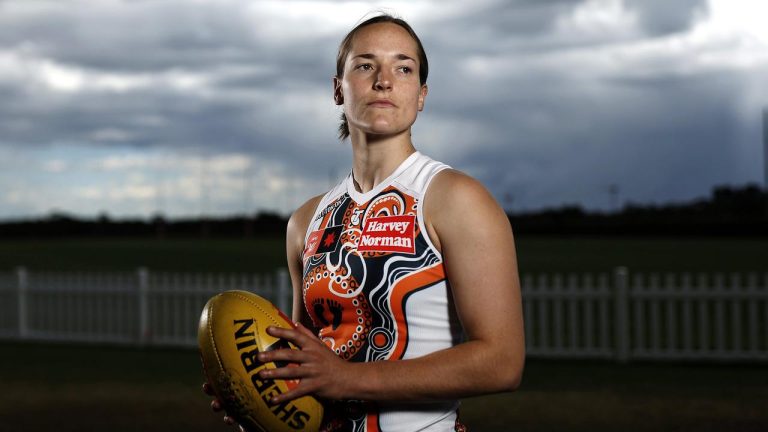The pain, the surgeries, the grueling rehabilitation process and the intense stress on your mental health – AFLW player Isabelle Huntington says the impact of an ACL tear doesn't diminish after the second or third time.
Huntington, 24, has torn her ACL three times in six years. She is part of a growing club of elite female athletes who have suffered triple ACL injuries.
Joining the club this year alongside AFLW player is Matildas fringe player Holly McNamara – who tore her ACL for the third time playing in the A-League just days after being called up to the national team.
Sydney FC midfielder Taylor Rae is back in the A-League this season after her third tear.
Huntington said thoughts of quitting the game began creeping into her head during her second stint in rehab, and her voice grew louder during her final injury.
“There are definitely periods when you think you won't be able to come back or at least get back to the level you were playing at,” she said. “It's a dark and lonely time throughout those periods.”
“Especially the third, a lot of people don't come back from three successfully, so you have less inspiration in terms of athletes who have made it.
“It's also about how much your body can handle, it's obviously stressful, it's really hard and mentally challenging, and the impact it has on your life is huge.
“So there were doubts. But it's a huge proud moment when you go out there again, fingers crossed things will be great from now on.”
Dr. Chris Virtolo, chief knee surgeon, said research has shown that female anatomy makes women five to eight times more likely to suffer an anterior cruciate ligament injury than men.
Sport-specific programs have been formed with the goal of reducing the risk of ACL injuries, but Huntington said the part-time nature of women's sports makes them unrealistic.
“You don't have time to take a hard look at your body or to individual tailor and get sports medicine that can break down individual risks and things you need to work on,” Huntington said.
“It's almost one size fits all when you have a little time.
“There are definitely intrinsic factors that we have to address, but when you look at the research, a lot of it has been done primarily in males over the years and all the studies that we point to in terms of preventative things, even your rehab itself and the risk factors depend On male athletes.
“Studies take time but I think we need to invest seriously in the research and get to the bottom of the matter and find some answers.
“It's exhausting trying to balance work, study and professional sport – but the more professional we become and the more money we put into research, hopefully the more answers we'll get.”
The Bulldog turned Greater Western Sydney player tore her ACL for the first time when she was 17 years old.
“My first injury was in 2016, and then I came back and in my second match, I injured my other knee,” Huntington said.
“It was a few years between my second and third term, which I did (January 2022).”
She needed a long period of time off to recover from the third tear, taking 20 months, instead of the usual 10 to 12 months.
Huntington said that despite her experience and knowledge of the rehabilitation process, it has not been easier.
“I think I was trying to be very stoic when I did my first workout when I was 17, like we all would,” Huntington said.
“I've had a lot of downs and ups and downs mentally in my recent cases. But I've learned that this is normal, and having people to lean on for support in those moments has been huge.
Huntington said there were several elements that affected her mental health during the rehabilitation process.
“When you go through waves, the FOMO (fear of missing out) element is huge,” she said.
“At first you kind of get all the support and everyone comes around you and sends lovely messages which obviously really warms the heart, but then it dries up pretty quickly and that's when it gets difficult.
“I've personally found that the later stages of rehab are the hardest because you've been doing the same thing for 12 months in the gym which is very repetitive and you feel like you're so close but also so far and you have all these issues with 'Can I be the player I was?' before?
“And you ask yourself these questions.
“So that was probably the hardest part for me.”
Huntington made her triumphant return to the court in September, after being held back several times by an upset and her confidence returning.
The 24-year-old is looking forward to a full pre-season and season with the Giants next year.
Originally published as Isabelle Huntington, who has torn her anterior cruciate ligament three times, is using her experience to inspire A-League footballers.

